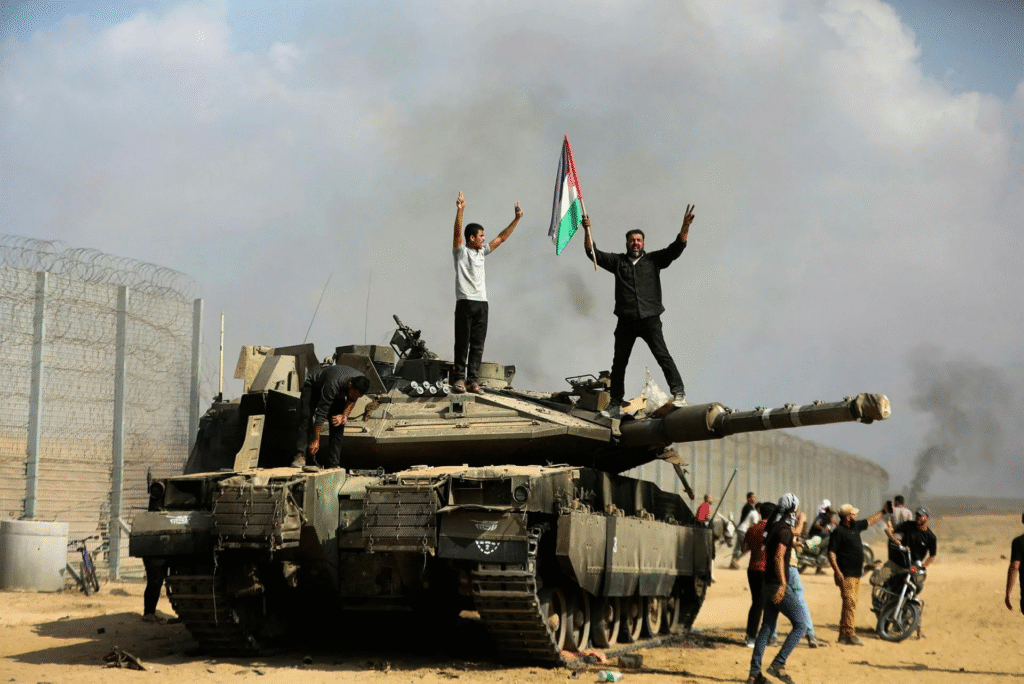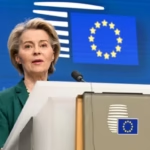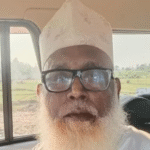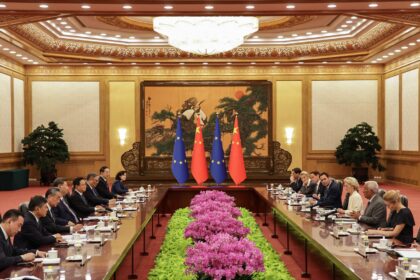Syria’s Al-Sharaa Vows Justice After Attacks on Druze: “Not Afraid” Amid Ongoing Israeli Strikes on Damascus – 47 Killed in 10 Days
Syria’s Al-Sharaa boldly vows justice for recent attacks on the Druze community, declaring he’s “not afraid,” as Israeli airstrikes on Damascus intensify—47 killed in the last 10 days
Syria’s interim President Ahmed al-Sharaa stated on Thursday that safeguarding the Druze population and their rights is a top priority, following Israel’s pledge to target Syrian government forces accused of attacking Druze communities in southern Syria.
1. In his first televised address since Israel’s heavy airstrikes on Damascus the previous day, Sharaa assured the Druze community, saying, “We reject any attempt to drag you into the hands of an external party.”
2. “We are not among those who fear the war. We have spent our lives facing challenges and defending our people, but we have put the interests of the Syrians before chaos and destruction,” he said, as reported by Reuters. He added that the Syrian people are not afraid of war and are ready to fight if their dignity is threatened.
3. Sharaa further condemned Israel’s widespread attacks on both civilian and government sites, pledging to hold accountable those “who abused the Druze people”, as reported by AFP. He also noted that security in Druze areas would be entrusted to local elders and community factions. Sharaa is struggling to reunify Syria amid deep distrust from various groups concerned about the potential rise of Islamist governance. Tensions worsened in March following mass killings targeting the Alawite minority, further straining intercommunal relations, Reuters reported.
4. The United Nations Security Council will meet on Thursday to address the conflict, diplomats said. “The council must condemn the barbaric crimes committed against innocent civilians on Syrian soil,” said Israel’s ambassador to the U.N., Danny Danon, as reported by Reuters. “Israel will continue to act resolutely against any terrorist threat on its borders, anywhere and at any time.”
5. US Secretary of State Marco Rubio said all the parties involved in the clashes have agreed to stop the violence soon. “We have agreed on specific steps that will bring this troubling and horrifying situation to an end tonight,” he said in a post on X, without providing details. Rubio earlier said the US was “very concerned” and “we want it to stop,” though stopped short of calling on Israel to halt its actions.
6. According to a report by Reuters, Sweida residents said they were holed up indoors. “We are surrounded and we hear the fighters screaming … we’re so scared,” a resident of Sweida said by phone.
7. Cracks of gunfire interspersed by booms could be heard in the background. “We’re trying to keep the children quiet so that no one can hear us,” the man added, asking not to be identified for fear of reprisals. According to Syria’s health ministry, dozens of bodies, both civilians and fighters, were found in a hospital in the city.
8. The Syrian Network for Human Rights reported that 169 people have died in the violence this week, while security sources estimated the death toll at 300. Reuters was unable to independently confirm these figures, Reuters reported.
9. Since the fall of Assad’s government, Syria’s Druze population, estimated at around 700,000 has strengthened its ties with Israel, which is home to about 150,000 Druze.
10. The Druze are an Arab minority whose religion branched off from Islam. Numbering around 1 million globally, they primarily reside in Syria, Lebanon, and Israel.
In a defiant and emotionally charged statement, Syrian political figure Farouk al-Sharaa has broken his silence amid rising tensions in the southern regions of Syria. Speaking out strongly against recent brutal attacks on the minority Druze community, Al-Sharaa declared he is “not afraid” and vowed to deliver justice. His remarks come at a time of escalating Israeli airstrikes on Damascus and surrounding areas, leaving at least 47 people dead over the past 10 days, according to local and international monitoring groups.

The Druze, an ethnoreligious minority primarily residing in southern Syria, have increasingly come under targeted violence by unknown armed groups in recent weeks. Multiple villages in Sweida province, where the Druze are largely concentrated, have faced bombings, abductions, and shootings. The latest wave of attacks, which included an ambush killing of seven Druze civilians, has triggered local protests and outrage across Syria and the diaspora.
Al-Sharaa, who rarely appears in public since stepping away from active politics, made a surprise speech during a gathering of community leaders in Sweida. “We will not be intimidated. We are not afraid,” he said. “Those who target our people must know that justice will come—not from foreign powers, but from within Syria itself.”
His bold remarks were met with loud applause, and clips of his statement have gone viral across Arab social media platforms, rallying support for the Druze cause.
While internal violence grows, Syria is simultaneously facing renewed aggression from outside. Israeli fighter jets have been relentlessly bombarding Damascus and its outskirts, reportedly targeting Iranian military installations and Hezbollah-linked warehouses. Over 20 separate airstrikes have been confirmed since July 7 alone.
The Syrian Observatory for Human Rights (SOHR) reported that at least 47 people, including both Syrian soldiers and foreign fighters, have been killed in these latest Israeli operations. Residential zones near the international airport were also damaged, forcing dozens of families to flee for safety.
Israel, which rarely confirms specific operations, has stated in past briefings that its goal is to prevent Iranian entrenchment in Syria, a stance that continues to draw condemnation from both the Assad government and regional human rights groups.
The twin pressures of internal sectarian violence and external military attacks are stretching Damascus to a breaking point. Analysts say the Syrian government is struggling to respond effectively, especially in regions like Sweida where it has historically had limited direct control due to the Druze community’s autonomous tendencies.
However, Al-Sharaa’s emergence and strong rhetoric may signal a new shift. Once a senior official and foreign minister under Bashar al-Assad, Al-Sharaa has retained moral credibility among many Syrians, especially minorities. His pledge to protect the Druze has sparked renewed calls for unity and self-defense among southern Syrian tribes.
International human rights groups and Druze leaders abroad, including in Lebanon, Israel, and the U.S., have condemned the recent attacks. They have also urged global attention toward both the Druze community’s plight and Israel’s continued strikes on civilian infrastructure.
Meanwhile, the United Nations has called for an urgent investigation into the violence, warning that the situation could spiral into broader sectarian conflict if not addressed.
As tensions grow on all fronts, Syria stands at a critical juncture. With voices like Al-Sharaa re-entering the public stage and communities demanding accountability, the path forward may depend on whether justice and security can be delivered—not just by state power, but by the collective will of the Syrian people.








